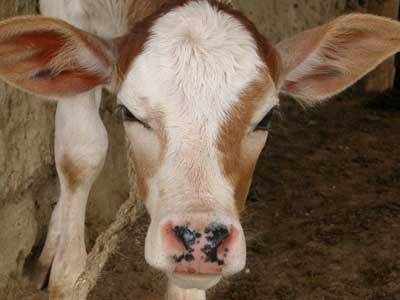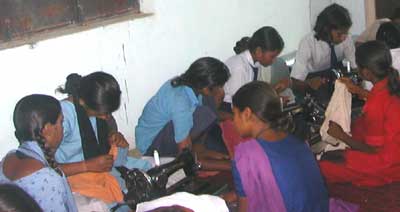|
|
|
|
|
|
|
|
|
|
Bhartiya Gramin Vidyalaya |
|
|
|
|
 |
|

|
|
 |
|
|
|
|
|
Projects Completed
|
|
|
|
|
|
Apart from running the school in village Kunaura, the
organization has taken upon itself to raise the socio-economic status of the
people of the area. Some of the projects completed so far include:
|
|
|
GIRLS’ EDUCATION
|
|
|
Before Bhartiya Gramin Vidyalaya was
started, girls of the
area were totally deprived of education beyond the fifth grade because their
parents were unwilling to send them to schools where there were only male teachers.
Since Bhartiya Gramin Vidyalaya was headed by
a woman -- Mrs. Nirmala Misra -- the villagers
had no hesitation in sending their daughters to the school. Hundreds of
girls of the area completed their matriculation and found meaningful
employment, or pursued higher education and married educated, well-to-do men,
something they could not hope to do earlier.
For the last two years, the school has also provided two sets of small
monthly scholarships – one to girls exclusively, and the other to both boys
and girls – based on their academic performance. In the general competition
for scholarships, there is a stiff, healthy competition for the scholarships
but girls always do better. The school wants to increase the number and
amount of scholarships and introduce more such incentives to encourage
children.
|
|
|
|
|
|
|
|
 |
|
|
|
|
|
|
|
ADULT EDUCATION FOR WOMEN:
|
|
The programme, called the Mahila Condensed Course, was funded in large parts
by the Central Social Welfare Board, in which no fee was charged and books
and stationary were provided free of cost. The programme was of great help
to the women who were either dropouts or had no occasion to go to school,
but were willing/needed further education to uplift their family condition.
Eight batches of 25 adult women each have been successfully educated to the
matriculation level. The programme was implemented in villages Kunaura,
Amaniganj and Itaunja where women from dozens of villages received
education under the programme. A large number of the 200 women who received
education there are employed as instructors in Balwadi and Anganwadi
programmes of the Govt. of Uttar Pradesh. Some of them have got employment
in health centres and other professions. They are now supplementing their
family income and command respect and financial independence in their families
|
|
|
|
|
|
|
|
|
BALWADI:
Under the Balwadi programme, pre-primary and primary class students were
provided with high calorie nutrition during school hours. The scheme proved
to be an incentive for poor, often malnourished, students to come to school.
Batches of 30 children in the age group of 6 to 9 years were selected in
consultation with the representatives of Central Social Welfare Board. The
children were provided midday refreshment, free education and playground
facilities. The programme after running for about 10 years has now been
discontinued on account of financial constraints.
|
|
 |
|
|
|
|
|
|
|
|
CHILD NUTRITION:
|
|
A scheme supported by CARE was meant for children below the age of six
years. Under this scheme, porridge was given to the school by the sponsoring
agency through the state education department. The porridge was cooked in
the school and offered to the children at midday as a supplement to their
daily food. The scheme was successfully conducted for four years but was
discontinued by the Education Department due to lack of support from the
funding agency.
|
|
|
|
|
|
|
|
|
WOMEN’S NUTRITION PROGRAMME
|
|
The programme was sponsored by the development block of Bakshi-ka-Talab and
was meant for pregnant women and infant children. Mrs. Nirmala Misra was
convenor of the programme and village women used to assemble in the school
campus for receiving the nutrients. Under the programme, the beneficiaries
were provided porridge, boiled wheat, soybean oil and other nutrients. The
programme was successfully run by the Bhartiya Gramin Vidyalaya according
to the norms of the sponsoring agency for the duration it was sanctioned.
|
|
|
|
|
|
|
|
|
|
|
|
MINI DAIRY FOR POOR WOMEN:
This was another Central Social Welfare Board scheme for destitute women
conducted by the school. It involved 15 beneficiaries who were selected and
provided interest-free loans for starting mini dairies. The loan was payable
in instalments from the income generated from the mini dairy project. The
scheme proved to be a boon for the 15 families. Bhartiya Gramin Vidyalaya
acted as trustee and monitoring agency of the funds that have now been
refunded to the government after successful completion of the programme.
Beneficiaries are leading a better life than before. This was one of the
most successful programmes in the district.
|
|
|
 |
|
|
|
|
|
|
|
|
EXTENSION PROGRAMME
|
|
Under this programme week-long camps are organized for rural women to
educate them on nutrition, general hygiene, family planning, importance of
education and rural upliftment. Methods to prepare locally available and
inexpensive balanced diet are explained to the women. The programme is sometimes
supported by the government’s Block Development Office and at other times by
school resources. Rural women are also given training in the areas of
advancements in agricultural practices, family planning, child nutrition and
general hygiene. Male guardians of school children are invited separately
for group discussion on the same subjects. The programme is quite popular
and aims to cover environmental problems, tree plantation and surface water
management if funds are available.
|
|
|
|
|
|
|
|
|
TAILORING TRAINING FOR WOMEN:
|
|
|
Under this scheme, 64 women were selected from small and marginal farmer
families in two batches for a free tailoring training so that they could
supplement their family income and save their children from child labour.
The scheme was a part of the Integrated Rural Development Programme and was
conducted at Itaunja town and Kunaura village. The beneficiaries were given
a stipend sanctioned by the funding agency and they were trained totally
free of cost. Women were helped in buying sewing machines from the
money they received as stipend, along with subsidy offered by the
government. The trained women were encouraged by the school to start small
scale production. Many of them are earning their livelihood through sewing
and knitting. In the initial years, Mrs. Misra also helped them marketing
the garments they manufactured.
|

|
|
|
|
|
|
|
|
|
CLOTHES TO THE NEEDY
|
|
The school requested persons from urban areas to donate clothes to the poor
children and women of the area. Swami Pathik Sewa Samiti and other well
wishers of the school help the management distribute warm clothes
every year to the poor children and women during the winter season. However, a large
number of children come in loose shirts in the harsh winters, and have very
few clothes to wear.
|
|
|
|
|
|
|
|
|
EXHIBITIONS
|
|
The school compound serves as an ideal site for exhibitions organized by the
management to bring about social awareness in the area. Several such programmes have been arranged in the past at Kunaura as well as in urban
areas. The school has participated in various exhibitions to sell and
exhibit products manufactured by rural women. The school has earned a
certificate from the then Governor of Uttar Pradesh for the best stall at
Lucknow Mahotsava, an annual and prestigious exposition that draws tens of
thousands of people and participating stalls from across the country.
|
|
|
|
|
|
|
|
|
|
|
|
|
FORESTATION CAMPS
The school conducts forestation camps for the school children. The project
of planting and looking after at least one tree is assigned to each student.
The scheme brought about a sense of awareness fro environment among the
students and affection for the trees planted by them. Due to this scheme the
formerly barren area in the school campus is full of greenery now.
WOMEN’S TRAINING IN FOOD PROCESSING
The scheme was supported by the United Nations World Food Programme and was
aimed at training rural women in various aspects of food processing. Poor
women from the nearby villages, mostly from the backward section of society,
were indentified and trained in the school campus.
|
 |
|
They were then taught how to start their own cottage industry including the
preparation and marketing of food and snack items like vadi, papad, potato chips, mungaudi, porridge, besan;
grinding and packaging of powdered spices The programme has been
successfully completed and the women are being motivated to form a
cooperative society to run the scheme commercially.
|
|
RECREATION
The school organizes a wide range of games and sports activities to develop
the personality of students, often encouraging them to engage in rural
sports that they have grown up on, even while showcasing to them other games
like cricket, football and volleyball. The school also organizes festivals
at which children perform in ballets, dramas Ram Lila and other musical events.
|
.
|
|